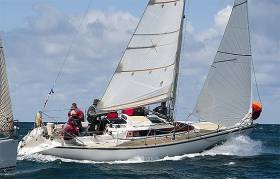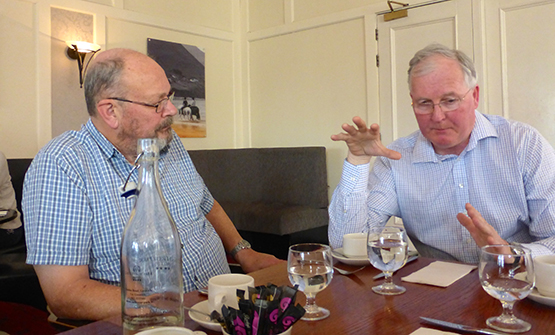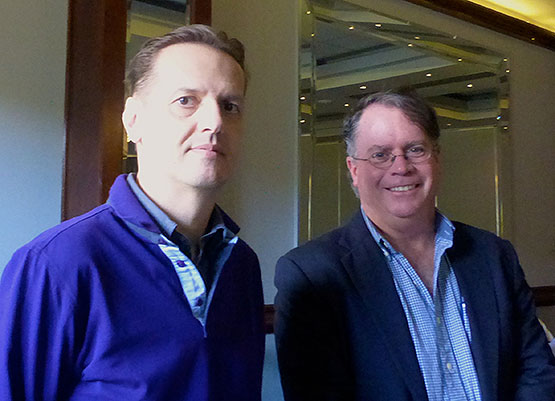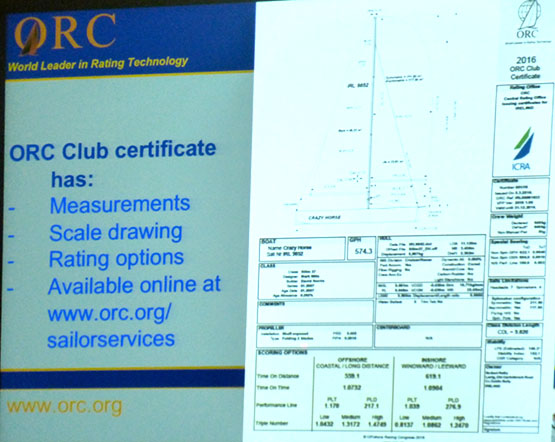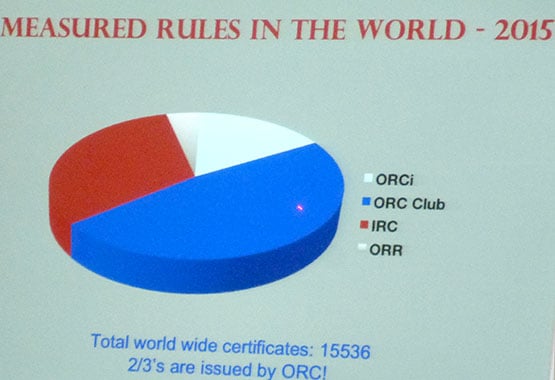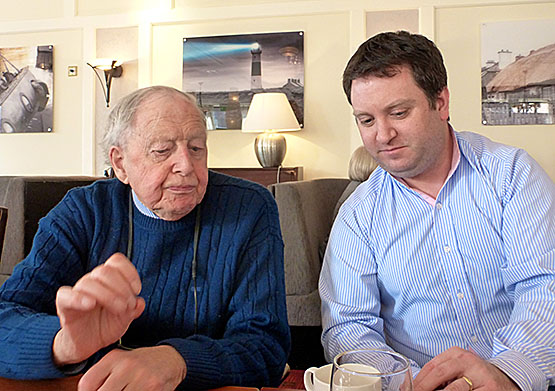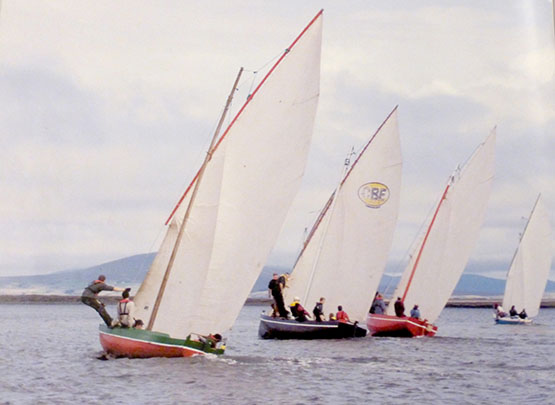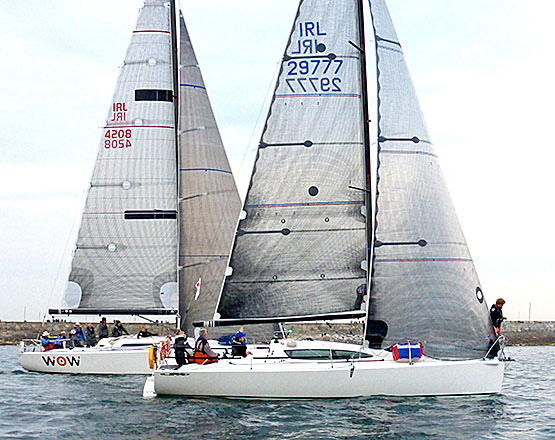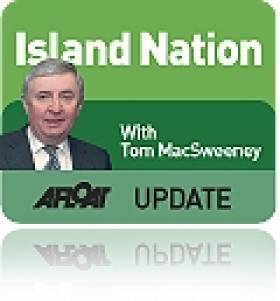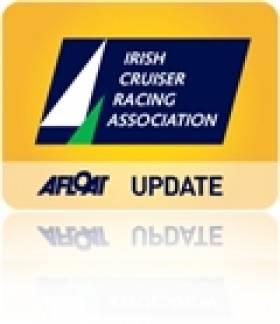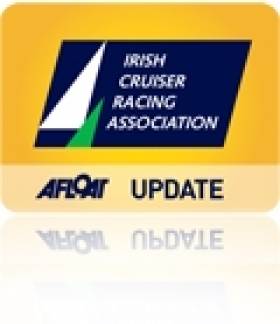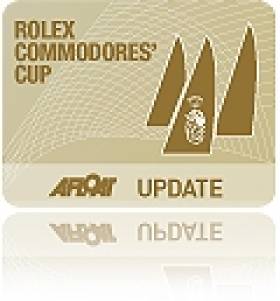Displaying items by tag: Denis Kiely
The Irish Cruiser-Racer Association (ICRA) is a unique organisation. “Run by sailors for sailors”, it is nevertheless a very land-centric administrative body whose only manifestation afloat as a group with its own identity is seen at the organisation of the annual ICRA Nationals. And the sense of it relating purely to the island of Ireland is accentuated by the fact that much of its work is essentially back-office activity, dealing with handicaps and all the other paraphernalia involved in providing the nation’s numerous and very diverse cruiser-racer fleet with meaningful racing. W M Nixon went to last Saturday’s ICRA Conference to get a flavour of what ICRA does, and came away both impressed and stimulated.
Sweeping along southwestward towards Limerick on our wonderful motorway system, while one’s body stays firmly on the dual carriageway, the mind can wander into any pathways it wishes. So we got to thinking that, in this age of increasing numbers of administrators trained to third level degrees in the running of not-for-profit organisations, it’s a bit odd to find a very successfully central organisation which is apparently run – and well run at that - on a Corinthian basis “by sailors for sailors”.
Surely in today’s climate, which favours key bodies such as this being run by highly-trained specialists on at least a semi-professional basis, a seemingly amorphous organisation which is “run by sailors for sailors” is verging on a clear case of the asylum being taken over by the lunatics?
We’d soon see. Meanwhile, why on earth hold an annual conference in Limerick? With Ireland’s population distribution changing so rapidly, skewing both towards the large urban centres and particularly towards the east coast and Dublin, surely anyone organising a national conference would find it attendee-friendly to look at the latest map of population weighting. As it happens, I’m not sure that such a map exists, but we’d like to think that with today’s computers it is possible to construct a map where, after due calculation, you could pinpoint to the exact centre of Ireland’s total population distribution.
So you set out heading for Limerick at an unfeasibly early hour thinking that maybe a central location such as pretty Portlaoise or tidy Trim would probably be Ireland’s central point in relation to population distribution. But after some smooth time on the road with the sense of the wonderful west coast coming ever nearer, you begin to wonder why ICRA didn’t make a proper job of it, and take us to Dingle where we can breathe that wonderful Atlantic air and think great thoughts of sailing the high seas.
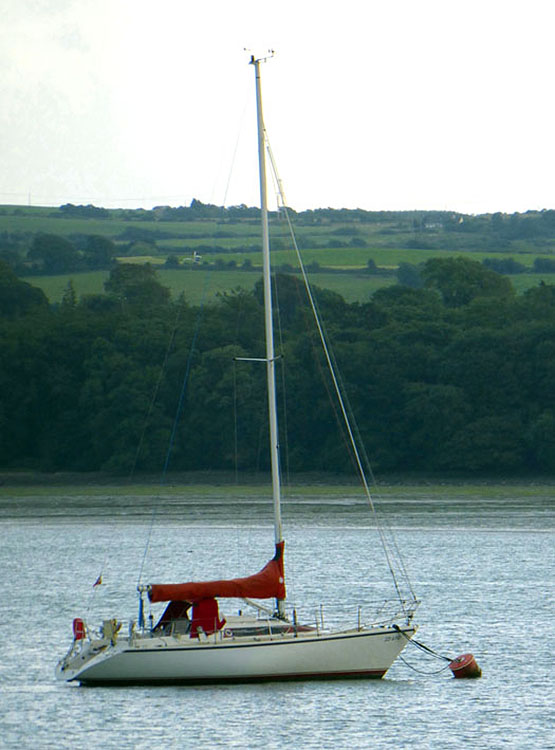
Far from the pressures of the cities of the east and south coasts, Dis-a-Ray is moored in the peaceful surroundings of Tarbert, where the south shore of the Shannon Estuary has already become part of the Kingdom of Kerry. Photo: W M Nixon
As it is, though the Dubs may think of Limerick as being on the western seaboard, it’s actually remarkably central when you draw lines across Ireland between all the best sailing locations. And as we knew that the position of Commodore of ICRA was going to pass on Saturday from Nobby Reilly of Howth (the Dingle of the East Coast) to Simon McGibney, Limerick was just about spot on in terms of equal travel time. For although the new Commodore has Foynes YC on the Shannon Estuary as his home club, his Dehler 101 Dis-a-ray is actually moored at his home at Tarbert which is further west down the Estuary, so much so that Tarbert is in the Kingdom of Kerry.
We arrived in to find a virtually full house distributed around a room-circling table such as they use for international diplomatic conferences to make peace with rogue states, with the layout being planned so that everyone can be an equal participant. It was grand for those of us who had arrived in the nick of time to get a seat, as we’d the fully-equipped table in front of us (did anybody else find it the devil’s own job to open the rather good but tightly-wrapped little sucky sweets which are essential to a talking shop?), but being Ireland several people arrived late, the show was already on the road, and they’d to find a seat as best they could.
All of which meant that there was a bigger turnout than expected, which is good news for ICRA. And for those of us comfortably ensconced, it made for a fascinating throughput of information by a long list of speakers, even though the layout meant that networking was restricted to the one hour lunch break if - like many people - you were relying on the 3.30-3.45pm wrap-up to facilitate returning to Dublin or Cork or wherever for a completely different event that night.
From the beginning, the dominant theme was on how we get more people into sailing, and everyone blithely talked as though we’re offering Joe Public a warm and sunny Croatian sailing product right here in Ireland, cheerfully ignoring the fact the last two summers have been plain lousy in terms of good weather.
Certainly the sailing was great for the enthusiast, but can you imagine a newcomer to the rough and ready sailing world wondering where on earth the attraction of it all was to be found as they were blown and bashed around at what we thought of as the utterly wonderful ICRA Nationals at Kinsale in June, or took in the all-too-typical variety of Irish summer weather at the hugely successful Volvo Dun Laoghaire Regatta in Dublin Bay in July?
Yet there is a fresh demand out there, and two of the morning’s speakers, Alistair Rumball of the Irish National Sailing School in Dun Laoghaire and Des McWilliam of McWilliam Sailmakers in Crosshaven, gave excellent talks on encouraging it, with Alistair showing us how his programme of moving beginners through dinghies and on into the school/club’s1720s, then became an inevitable progression into gaining experience and instruction on the school’s Prima 38 Lynx.
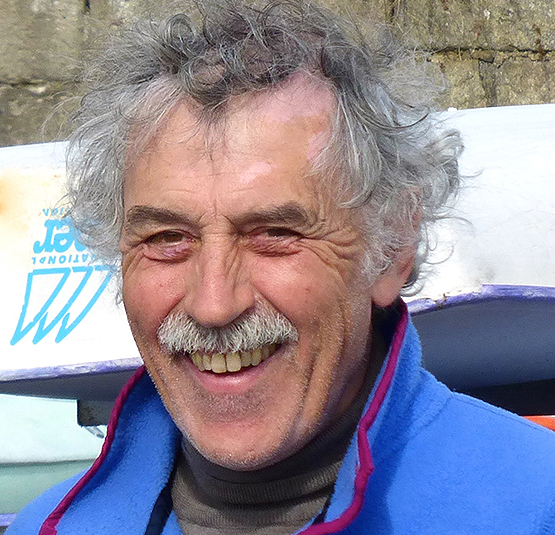 The mover and shaker. Alistair Rumball’s Irish National Sailing School in Dun Laoghaire is first port of call for many newcomers to sailing. Photo: W M Nixon
The mover and shaker. Alistair Rumball’s Irish National Sailing School in Dun Laoghaire is first port of call for many newcomers to sailing. Photo: W M Nixon
“Lynx has been a greater success than we could have ever dreamed of” he said. “She has been so booked out with people keen to learn about sailing a cruiser-racer that we haven’t been able to get as much actual racing with ISORA and so forth as we’d like. But for 2016, she’s being taken out of our Dun Laoghaire setup for long enough to be organised for a proper shot at the Volvo Round Ireland”.
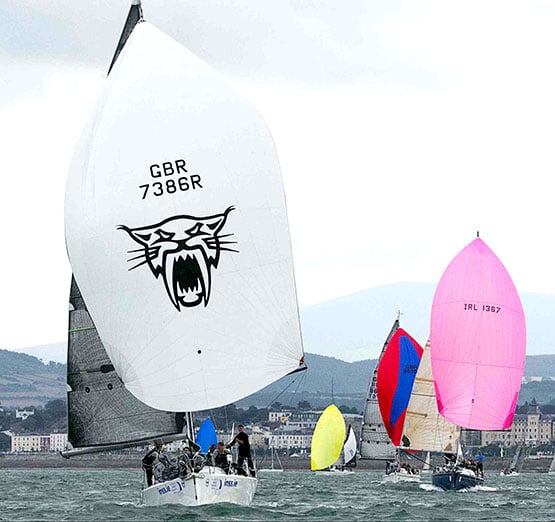
The double life of a Prima 38. The INSS’s Lynx in full racing mode in Dublin Bay (above), while below she is seen in early training mode as she takes a crew of beginners in cruiser-racing out for some formative experiences
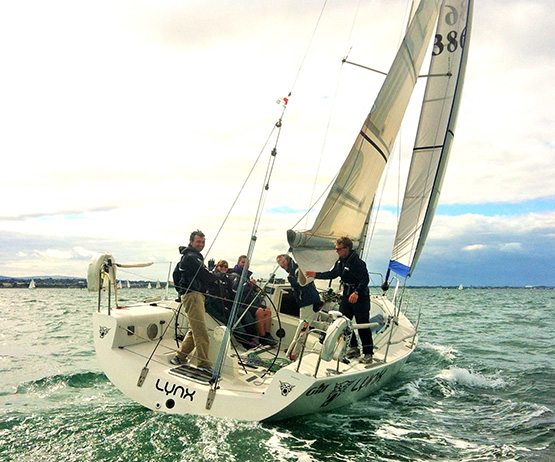
As of last weekend in Limerick, there were just two crew places left aboard Lynx for this year’s Volvo Round Ireland on June 18th, and they’ve probably been snapped up by now. But the Rumball presentation underlined the fact that there are people out there who are mad keen to get into cruiser-racing, and it was up to ICRA to guide its members as to how best to tap into these wannabee sailors, instead of bleating all the time about how hard it is to find crew.
Des McWilliam leapt into the same theme, and gave us a crash course in how to make crewing on your boat more attractive to strangers. Admittedly the experience of seven years of acute economic recession have understandably made those who have kept boats in racing commission more than a little stressed. But if they want to reap the benefits of having struggled to stay in the boat-owning stream, then they have to make their cruiser-racers pleasanter to sail on, and more effective racing machines.
The McWilliam message was blunt in the extreme. “As a sailmaker in Ireland, each year I will race actively at many venues on upwards of 40 boats, both evenings and weekends. I will experience many different management and sailing styles. At the end of the year looking back, I usually realise that there might be only ten to a dozen boats out of that total of forty to which I would gladly and freely return for the good sport, the efficient sailing, the successful racing, the camaraderie – the fun. The rest of them are just work, involving duty visits. Please remember this when you are setting up the running of your boat, and trying to encourage people to sail with you.”
Des McWilliam of Crosshaven and Rory Staunton of Mayo. Des provided the meeting with some telling home truths about how attractive (or not) cruiser-racers throughout Ireland can be to sail on, while Rory Staunton led the charge in wondering why ORC and IRC cannot be amalgamated, and then went on to outline a new trailerable 33-footer he and an international group of friends are developing to make the incomparable west of Ireland a more accessible sailing area
We earned our lunch by going through an intensive session with Dobbs Davis of the Offshore Racing Congress, who had come to the conference with Zoran Grubisa to promote their measurement rule, which is used worldwide anywhere that IRC is not dominant, and in some key events such as the Rolex Sydney-Hobart Race, they are used in tandem, though IRC is currently the more-used system in that classic event.
It says everything about how Irish sailing punches way above its weight that these two guys thought it worth their while to come among us and evangelise for their system in a country which has a more-than-friendly relationship with the IRC and the people who run it. But it was fascinating stuff, making an input which added real spice to the day.
Davis is Chairman of the ORC’s Promotion & Development Committee, while Grubisa heads the Rating Officers Committee, and they run a system which is now the ISAF-approved rating method for the ISAF Offshore Worlds, which this year will be staged in Copenhagen in July, which as it happens is more or less the same time as the Royal Cork YC will be staging the new European IRC Championship in Volvo Cork Week at Crosshaven.
So the presence of the evangelists from the ORC at the ICRA conference could have opened up a right can of worms, but fair play to Dobbs Davis, he gave such an enthusiastic and lucid explanation of the completely transparent way in which ORC function that, for the time being at least, one’s instinctive loyalty to IRC was suspended out of intellectual curiosity.
Leading Offshore Racing Congress officers Zoran Grubisa (left) and Dobbs Davis were in Limerick to evangelise for the ORC Rating system
While IRC still has one or two hidden elements – the “Black Box” factor – with the transparency of ORC, you can always see how different inputs are effecting the final figure. One-design sailors may find all this utterly yawn-making, but as Davis pointed out, although there are so many successful cruiser-racer One-Design classes in America that ORC has yet to gain significant traction there despite being first set up in the US forty years ago, elsewhere in the world more and more people are coming to ORC as they enjoy watching boat innovation and performance analysis interacting to make their sailing more interesting and the results indicative of pure sailing ability.
The approachability of the ORC system was presented as one of its advantages
The slice of the cake worldwide for the different rating systems
But as we all know, where IRC and OCR are run side-by-side, despite the IRC’s hidden elements the two outcomes are often very similar. And in Ireland where we have a soft spot for the old S&3 34s which set world alight in 1969-73, the fact that the veteran though beautifully restored S&S 34 Quikpoint Azzura was overall winner of the Rolex-Sydney Hobart Race under OCR, after so nearly doing it on IRC, caused a bit of heart-searching. But nevertheless Rory Staunton from Mayo SC spoke for many when he demanded to know why IRC and ORC couldn’t get together and resolve their small differences for the general benefit of the offshore racing fraternity. Dobbs Davis said his door was always open, but that began to feel a bit too reminiscent of the current efforts to form a government, so we were glad enough to take a break for lunch and then return to the rating topic, but from an entirely different point of view
The inevitable expense in maximizing your boat’s performance potential under either IRC or ORC made the sheer economy of ICRA’s Progressive ECHO system seem immediately attractive, and the lead-in the afternoon session by SCORA Commodore Ronan Enright even more apposite. Because the fact is, you could run the Progressive ECHO Handicap System without even knowing what a boat looks like, let alone having her dimensions measured do the last millimtre.
Donal O’Sullivan of Dublin Bay SC, and Ronan Enright, Commodore SCORA, discussing sailing administration matters during the lunch break at Limerick. Enright went on to give an illuminating presentation about developments in Progressive ECHO Photo: W M Nixon
In the absence of ICRA’s ECHO supremo Denis Kiely - unavoidably absent for family reasons – Ronan Enright gave a quietly telling performance. It’s fascinating that though ECHO started life as the East Coast Handicap Organisation back around 1971-72, it’s now a nationwide service overseen by ICRA, and its most active area of development is in the cauldron of concentrated cruiser-racing which you find when the activities of Cork Habour and Kinsale are combined.
Basically, Progressive ECHO depends on the results of the most recent race, after which, if certain criteria have been fulfilled, the results are automatically re-computed to give boats a new rating based the supposition that they had all finished dead level on handicapped time. My own most recent experience of racing with it when it is being enthusiastically applied was in the Volvo Dun Laoghaire Regatta, which was a perfect test-bed for the system, as it was a compact series with the same fleet throughout.
The result is a series-long level of commitment by boats and crews who, under a more brutal system, would have seen their interest and enthusiasm flag after Day Two or even earlier. So really the message is: If we’re trying to get people to enjoy sailing and particularly to enjoy racing which is what the non-involved most easily comprehend, then Progressive ECHO is doing more to get bums on boats than anything else in Irish sailing, for believe me you have never seen anything quite so heart-warming as the response of a crew who, under One-Design or fixed handicap systems, had not been at the races at all, yet suddenly under Progressive ECHO they find they’ve recorded a win.
Which was all good news but perhaps the most interesting revelation of all from Ronan Enright was that the top IRC racers around Cork are now taking a closer interest in their Progressive ECHO showing than there are in their IRC results. For under IRC, they know they’ll be in the top six, but each post-race adjustment of Progressive ECHO gives them a very clear message about just how well or not they were really doing on the day.
Tom MacSweeney of this parish then hosted a forum which basically came down to how sailing can present a more friendly and accessible response to people who might be vaguely interested, and could be potential sailing enthusiasts. This involved him drawing on his training as a critical journalist, for as he admitted, when he first turned up with his first sailing boat – a Ruffian 23 – in Crosshaven, everyone from Denis Doyle downwards immediately made him welcome. But we can all think of non-assertive characters who are great sailors, yet if they hadn’t been in sailing families in the first place, they might not have taken up the sport at all owing to the sometime apparently closed nature of “yachting”.
We learned that very little of an Achill yawl is showing above the water after she capsizes. This is how they look in proper order
Allied to Des McWilliam’s incisive look at boats which you like to be aboard, and boats which you definitely don’t, and it all provided food for thought, as too did John Leech of Irish Water Safety with his no-nonsense presentation about a mature approach both to safety, and to being rescued. In an interesting mix of images, he showed us a photo of what happens to an Achill yawl when it capsizes. The result is an awful lot of rather waterlogged traditional boat under the surface, and only a little bit showing with the crew perched on top. As Des McWilliam was probably the only other person present with any idea of what an Schill yawl in full health looks like, the least we can do here is show you a photo of them in good sailing order. Meanwhile, John Leech concluded by saying that when you call out the ASR helicopters, think rather of how you can prevent your mast – if it’s still standing – from interfering with the rescue. Don’t for heaven’s sake use up emotional energy thinking about how much it all costs. They’re on standby all the time, and you the taxpayer have paid for them in the first place.
We concluded with Rory Staunton seeking interest and opinions for the new 33ft trailerable One-Design. While we all hope to get down to Clew Bay to sail the prototype this summer, could I suggest that one of the most exciting projects on the Irish cruiser-racer horizon is WIORA Week 2017 in the Aran Islands. So when they’ve finally got around to fixing a date, maybe the promoters of the new 33-footers could arrange to have a flotilla of them in Kilronan in 2017 to give the class a rocket-assisted launching.
Meanwhile this year’s WIORA West Coast Championship is under the auspices of the Royal Western of Ireland Yacht Club at Kilrush from June 29th to July 2nd. There’s so much extraordinary history in being able to write that simple bit of information that I reckon we’ll have to give it a complete blog in the future.
As for the ICRA Nationals, they’re at Howth from June 10th to 12th with both IRC and Progressive ECHO being used, while Volvo Cork Week comes up in July after the Volvo Round Ireland race has been tidied away in late June.
Although last Saturday’s Limerick gathering was essentially a wide-ranging conference, it was also the changeover to the new Commodore, with Simon McGibney taking on the mantle from the energetic and enthusiastic Nobby Reilly whose own boat, the Mills 36 Crazy Horse, was seen in virtually every event, and looked like heading for the win in Class at the ICRA Nats in Kinsale last June until new big winds swept George Sisk’s WOW to the fore. During Nobby’s busy time in the top office, ICRA’s activities and its reach steadily expand, while thanks to the persuasive efforts of Anthony O’Leary, a Commodore’s Cup team was assembled which regained the trophy in 2014.
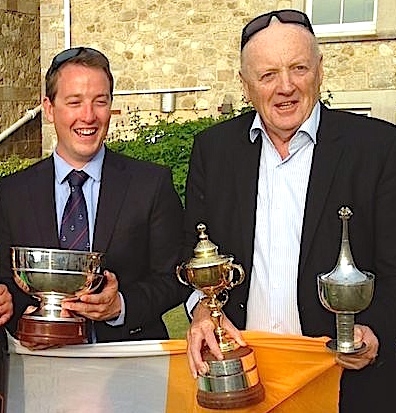 Ross MacDonald and ICRA Commodore Nobby Reilly at the Royal Yacht Squadron in Cowes in July 2014 after Ireland had won the Commodore’s Cup. At the ICRA Conference in Limerick last weekend, McDonald won a special award for his season’s results in 2015 with his X332 Equinox, while Nobby Reilly stood down after his successful years as Commodore, handing over the helm to Simon McGibney.
Ross MacDonald and ICRA Commodore Nobby Reilly at the Royal Yacht Squadron in Cowes in July 2014 after Ireland had won the Commodore’s Cup. At the ICRA Conference in Limerick last weekend, McDonald won a special award for his season’s results in 2015 with his X332 Equinox, while Nobby Reilly stood down after his successful years as Commodore, handing over the helm to Simon McGibney.
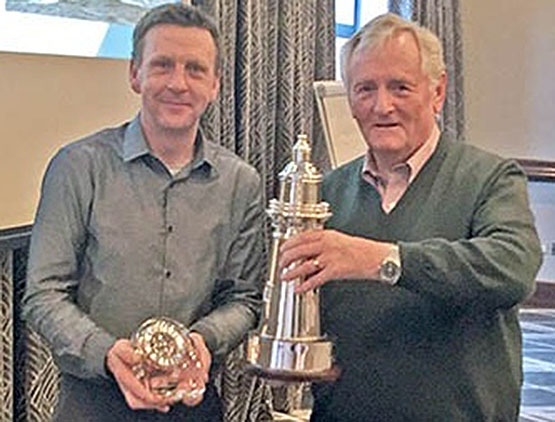
New ICRA Commodore Simom McGibney presents the “Boat of the Year” trophy to George Sisk of the Royal Irish Yacht Club, skipper of the Farr 42 WOW.
Work is going on behind the scenes to provide a strong defence this summer, but Anthony O’Leary wasn’t in Limerick to tell us about it, as he was away on his annual participation in America in the Viper 640 Championship, which just wouldn’t be the same if O’Leary wasn’t taking part - so much so that last year, he wasn’t present when his name came up as “Sailor of the Year” in Dublin, for he was away then too, Viper racing in the sun.
But other top sailors were there to round out the conference with the annual awards such as special performances by the likes of Dave Cullen with Checkmate XV and Ross Macdonald with Equinox and, while the ICRA Boat of the Year presentation, with warm acclamation, went to George Sisk of WOW, who not only admitted that his well-tested craft usually races with a crew of average age 53, but if he himself didn’t happen to be on board, the average age came down considerably………..And in case you think becoming ICRA Boat of the Year is all about glamour racing in sunshine, we close with a photo of WOW and the JPK 950 Alchimiste crawling towards the starting line for the Dun Laoghaire to Dingke race on the sort of damply windless evening that most folk would much prefer to spend comfortably at home.
It isn’t always glamour and warm sunshine and pleasant breezes. 2015 ICRA Boat of the Year WOW on a damp and windless evening approaching the start of the 280-mile Dun Laoghaire to Dingle race with the JPK 960 Alchimiste.
Who Is To Blame For The Decline in Sailing?
#sailing – Sailing is a sport, not the qualification of a superior social standing.
Is that fully understood by everyone involved in the sport or is there still an element of elitism which needs to be eradicated?
The term 'yachting' was dropped a few years from the title of the national representative organisation which became the Irish Sailing Association, amidst an apparent belief that 'sailing' would be less elitist as a descriptive term and more acceptable to the public.
Most 'yacht' clubs did not become 'sailing' clubs, though there are more 'sailing clubs' it would seem than 'yacht' clubs around the country. Boats did not generally become described in the American term of 'sailboats' but remained yachts.
I see no major problem with the term 'yachting' though I understand the sensitivities which surround the different terminology. I have no qualms about admitting that I own a yacht and feel fortunate to do so.
What is of more concern to me is that the sport becomes truly a 'sport for all' and is not riddled with different levels of social strata.
There remains a degree of public perception that sailing is an elitist sport. This has dogged it gaining more general acceptance and bedevilled its reputation.
Sailing, or yachting, should be a 'sport for all' in an island nation where it is based on access to the magnificent resource of waters surrounding us.
The perception of wealthy people with big boats, sitting in clubs behind signs of 'strictly private', is not conducive to creating a widely popular sport. There is a dichotomy here because the growth of interest amongst young sailors, with more involvement in dinghy sailing such as through Optimists, has been encouraging. So has the advent of more interest in schools in adopting sailing onto their sports curricula.
The movement for change within the ISA came initially from the dinghy fraternity, where many of us who now sail cruisers, began their love affair with the sport.
The breakthrough which sailing needs, to gain more general popular public acceptance, has not been made.
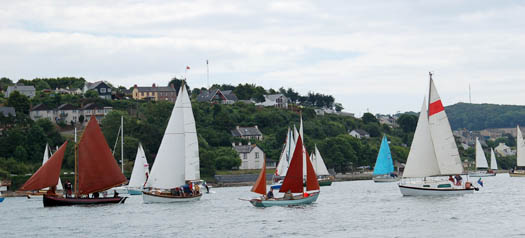
People sail boats of all types
Why is this?
Throughout my years of being a marine journalist and when marine correspondent within RTE, it was difficult to get coverage for sailing. I did achieve it, but there was always a bit of a battle to establish acceptance that the sport was not just for the wealthier part of the population, but that it permeated across all social milieu. I did get that message across by quoting figures of how many are actively involved in a day's racing organised by major clubs, compared with the attendance for example at some Irish soccer matches which got plenty of media coverage. I also stressed that it was a participative sport more than a spectator one. More people within the broadcast service have become involved in the sport. But generally in the media, there is still an impression that sailing is a sport for which you need a lot of money and this is perpetuated by the oft-quoted unfortunate analogy of standing under a cold shower and tearing up money.
But sailing – and yacht – clubs are also contributors to this failure to get the message of sailing as a sport for all across. In my experience as a journalist, most clubs are poor at their public relations and the issuing of information to the press, but yet complain that the sport does not get enough coverage, even if they do not provide the information. There are honourable exceptions, who provide good circulation of information and websites, but there are many other clubs who are pretty bad at sending information and whose websites are dismal failures, not updated for long periods of time.
At the annual meeting of the South Coast Offshore Racing Association in Kinsale Yacht Club in the Spring one participant told the audience that "yacht clubs to most people would be the scariest places to walk into."
Another said: "It is no wonder that we struggle as a sport to keep people as lifelong participants, even though we can and do attract younger people into the sport at an early age."
The warning signs have been there for years, for those who wanted to note them. Sailing needed to widen its appeal, to get more people into the sport for lifelong participation.
To survive a sport needs an organised structure and clubs are needed to provide this, they must have members who pay to join and support them. They cannot exist if people use them without joining and therefore not giving on-going financial and volunteer support.
So there is a dichotomy here. Why are clubs not getting enough members, a situation which appears widespread?
The economy over the past few years has undoubtedly been a contributory factor. People have lacked disposable income and, amongst families in particular, expenditure on non-essential matters has had to be cutback. Some clubs have responded with different arrangements for membership, but as I wrote in this blog last week, I still think that new, flexible approaches are needed, particularly to encourage crews, of which most active racing boats are short.
There are also people who sail and who do not join clubs, either they don't want to, or can't or there are not clubs close to them or for whatever reason. But they do sail, are they outside of the system and should they be considered. How can they be appealed to because they are involved in the sport. There are the traditional boats and the huge support they get. Some are members of the ISA, some of clubs, but many not so perhaps. There is a huge level of support for sailing in this sphere and many organised events which draw big support. Should the ISA reach out to these sailors, to this area of sailing activity?
This and many other aspects merit consideration to band together all interested in sailing, in all its facets. United in approach there would be a strong force which official authorities could not ignore when improved facilities and recognition are sought or when government and officialdom has to be challenged, such as in the imposition of new regulations.
On this month's edition of my radio programme, THIS ISLAND NATION, (click to play podcast above) I talked to the President of the Irish Sailing Association about his plan for a Strategic Review of the sport to deal with a decline and he accepted my suggestion that the impression of elitism is not good for the sport and has not helped its expansion and development. We also discussed whether there was too much concentration on racing and whether more support should be given to other forms of sailing, encouraging cruising.
David Lovegrove wants to get across the message that sailing is open to everyone. He would be particularly happy, he told me, if he could get that understood and accepted widely in public. We discussed how sailing can be a sport for all ages and for all people, with the uniqueness of enabling families to participate together if they wished. He recalled the time when he first got involved in sailing and the enjoyment and sense of friendship that abounded. Perhaps too, we agreed, there was less concentration then on being winners in racing and in high performance levels.
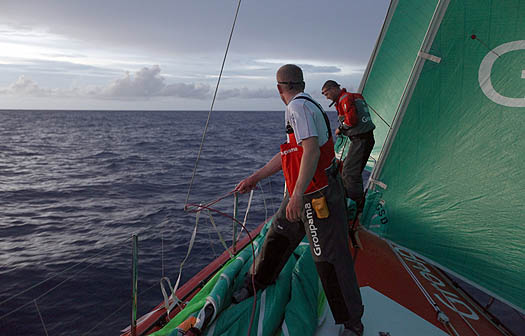
Ocean racer Damian Foxall of County Kerry
I think there is a need for Ireland to have a good presence on the international scene and that it is good for the country. It is also good for sailors to aspire to the highest levels of achievement, but have we got over-committed to competition to the detriment of the enjoyment of participation, of being on the water. Had the ISA also been too focussed on its own high performance programme and those who qualify for it and not given enough support to other sailors who may not have made it through the ISA system, but want to try on the international scene and should there be arrangements to support that. Also, for example, has the ISA been close enough to the top international sailors who have come from Ireland and sought to include them and utilise their services in promoting Irish sailing, such as Damian Foxall and Justin Slattery and where is the ISA in regard to the efforts of such as young David Kenefick making his own way onto the international scene through the Figaro Race.
All of these are interesting points to debate.
I take part in club racing, but I always try to make it clear to the crew that we are going out to enjoy ourselves and winning is not the overall aim, though it would be nice and we have been fortunate enough to do so from time-to-time. I don't like shouting on a boat, though sometimes getting something done quickly when needed can raise the vocal level. But if the enjoyment is taken out of the sport, that is not for the best.
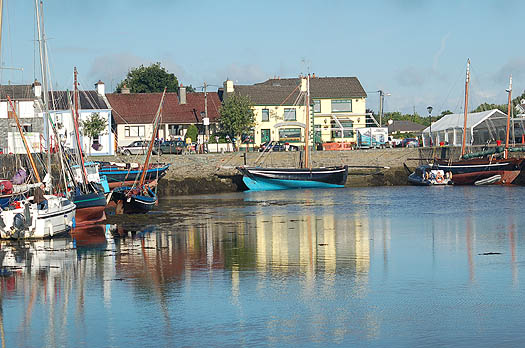
All forms of sailing need to be engaged
Again, here we have a dichotomy, other sports are hugely competitive-oriented, why should sailing not be?
There are issues to be addressed and I wish David Lovegrove and his team every success as they try to come up with answers. He told me in our interview, that this would not be a short-term solution, but would take a lot of work and commitment by the clubs themselves. Indeed. As I wrote in this blog last week, encouraging participation is essential to arrest decline. That will mean more innovative ways of involving people, a point which Denis Kiely, who has given tremendous national service to sailing made at that SCORA meeting in Kinsale and which impressed me.
He said that often crews did not get enough of a proper introduction to the sport, didn't have enough knowledge of it and weren't given such, didn't get training, could therefore feel unwelcome and then leave the sport.
Club marinas are pretty full of boats around the country, so it is at times hard to accept that there is a decline in participation, but the meetings which have led to the new approach by the ISA have shown problems, including dissatisfaction with the national association itself. David Lovegrove has accepted this and the need for change.
He spoke to me of his enthusiasm about the work ahead to re-define the sport and his confidence in the team he has appointed to oversee different aspects of the sport and to suggested changes. These are outlined in detail in the current/Summer edition of AFLOAT magazine.
His determination to create a strong, vibrant sport, is welcome. I wish him success with his efforts. Listen to his interview in my programme here on the Afloat website (above). Everyone interested in the future of our sport should respond positively. That commitment is what the sport needs.
So – who is to blame for the decline in sailing – all of us are, if we do not make changes to encourage more people into the sport and to stay in it and if we do not adapt existing systems to ensure they feel welcome. That means all of us who want to see sailing being a sport for all accepting that sailing is just that - a sport - not a badge of social approval.
Denis Kiely Steps Down as National Yacht Handicapping Officer
#icra – Denis Kiely has stepped down as the ISA's national yacht handicapping officer but continues in his position as Honorary Secretary of the Irish Cruiser Racing Association (ICRA) writes Claire Bateman.
After some two decades in office, Kiely is hoping to enjoy more time sailing his Formula 28.
Kiely has worked closely with Bob McPherson, the developer of the Sail 100 handicap system, that is universally used. In recent times he has collaborated with McPherson in fine tuning the system specifically for the Irish Cruiser racing scene.
National Award for Irish Cruiser Racing Association (ICRA)
In the three decades and more of the Mitsubishi Motors/Irish Independent "Sailing Club of the Year" assessments, there has never been an organization only seven years old winning the title.
In fact, seniority has often won the day, though in a country in which the oldest sailing clubs date from 1720 (Royal Cork) and 1770 (Lough Derg), it's difficult to find clubs and associations which are anything less than centenarians, let alone not yet in double figures.
But it was only as recently as June 2003 that the Irish Cruiser Racing Association came into being. It was at the biennial Sovereign's Cup series in Kinsale that Fintan Cairns of Dun Laoghaire, enthusiastically supported by the late Jim Donegan of Cork and other key personnel, successfully launched the idea of a nationwide organisation to co-ordinate the racing sport of "boats with lids".
At the time, it was a leap of vision. Having successfully headed Dublin Bay Sailing Club at a time of rapid growth, he was able to see the picture more clearly than those who reckoned that offshore racing organisations should be related to bodies of water rather than a land mass, for all that we're on an island.
Then too, the new association was envisaged as using established clubs and their facilities to stage its championship. In other words, the ICRA organising team would be the travelling people of the Irish sailing scene. On top of that, handicap competition with cruiser-racers was derided as "truck racing" by the white hot one design and dinghy sailors.
Yet the idea took hold, and the annual championship was successfully staged at venues as various as Crosshaven, Tralee, Howth, Kinsale and Dun Laoghaire, with Denis Kiely the essential ace number-cruncher in the back office. And in May 2010, with the mighty machine of the Royal St George YC in Dun Laoghaire providing the administrative centre, the Liebherr Irish Cruiser Nationals in Dublin Bay attracted a fleet of 117 boats, with great sailing.
On that event alone, ICRA would have been among the front runners for Club of the Year. But the best was yet to come. In recessionary times, getting a three boat team together to make a worthwhile challenge for the biennial Rolex International Commodore's Cup was a matter of making the best of limited resources. But ICRA – currently under the leadership of Barry Rose of Cork - was up to the job.
The team of Anthony O'Leary's Antix, Dave Dwyer's marinerscove.ie, and Rob Davis and Andrew Creighton's Roxy 6, had a convincing win. Thus ICRA in one season had catered very well for general run of boats and crews at home, and had come out tops at the top level internationally. It doesn't get better than that, and we salute them as Sailing Club of the Year 2011.
Commodores Cup: Send YOUR Good Luck Wishes HERE!
MANY OF YOU SENT GOOD LUCK WISHES AND NOW YOU CAN SAY WELL DONE TOO! SCROLL DOWN THE PAGE TO LEAVE YOUR CONGRATULATION MESSAGE!
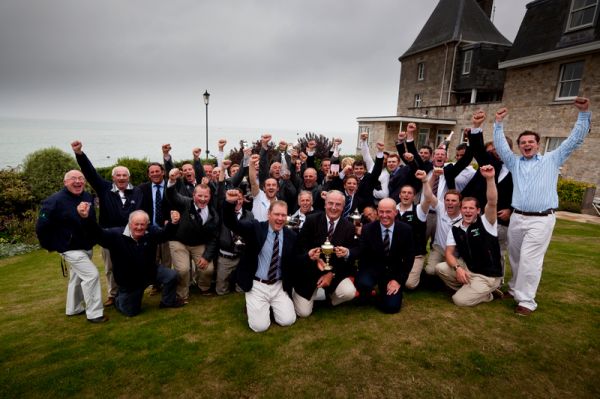
The ICRA Team Celebrations in Cowes, Photo: David Branigan
After a series of near misses in the Commodores Cup, there are many reasons why 2010 was an entirely appropriate timing for an Irish win in Cowes today.
Ireland's single three boat team (below) faced stiff opposition in the final ten team line up. Individual performances this season though, including a win at the British IRC Nationals, is proof, were it needed, that Ireland still was always on course to win the Commodores Cup.
Ireland's team on the Solent was Royal Cork based; Antix, Anthony O'Leary (Ker 39); Marinerscove.ie David Dwyer (Mills 39) and Roxy 6 Robert Davies (Corby 36). The full crew list for each boat is below, representing the very best of Irish sailing talent.
Third time lucky is how it was scripted in 08, but not how it was acted out. After first being jilted by the French and now, for the second time, by the English, the Irish could be forgiven for giving up on the cup but we never did. This victory represents the final week of eight months preparation for superb assault on the title.
PLEASE SCROLL DOWN TO THE END OF THE PAGE AND LEAVE YOUR CONGRATULATIONS MESSAGE!

Team Ireland 2010 Commodores Cup
Photos by Robert Bateman
IRL3939 Antix Anthony O'Leary (Ker 39)
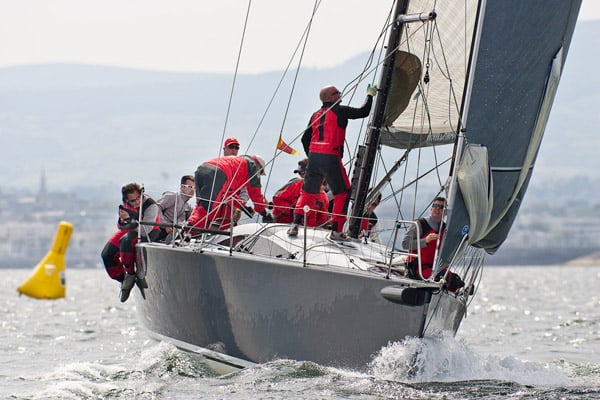
Anthony O'Leary (IRL)
David Lenz (GBR)
Peter O'Leary (IRL)
Ross Deasy (IRL)
Brian Lennon (IRL)
Stephen O'Sullivan (IRL)
Eoin Leahy (IRL)
Frederick Cudmore (IRL)
Simon Johnson (IRL)
Rory O'Sullivan (IRL)
Jimmy Houston (GBR)
Derek Moynan (IRL)
Tom Durcan (IRL)
Robert O'Leary (IRL)
Darragh O'Connor (IRL)
IRL39000 Marinerscove.ie David Dwyer (Mills 39)
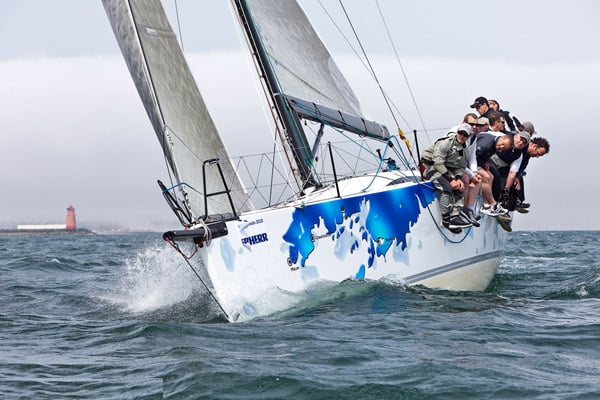
Andy Beadsworth (GBR)
David Bolton (IRL)
Padraig Byrne (IRL)
Alan Curran (IRL)
David Dwyer (IRL)
Bernard Fitzpatrick (IRL)
Brian Heneghan (IRL)
David Love (IRL)
Tom Murphy (IRL)
Nicholas O'Leary (IRL)
Clive O'Shea (IRL)
Sandy Rimmington (IRL)
Chris Schirmer (GBR)
Don Wilson (IRL)
IRL36000 Roxy 6 Robert Davies (Corby 36)
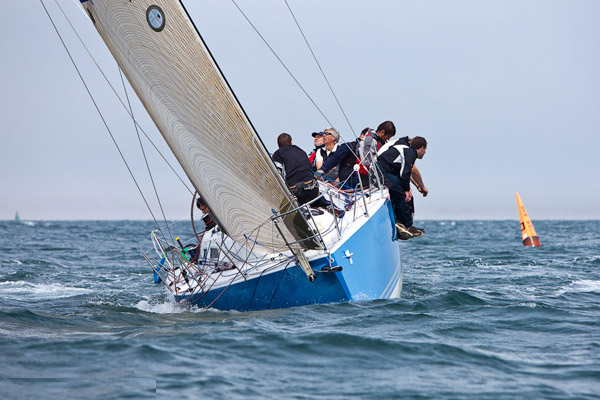
Rob Davies (GBR)
Andrew Creighton (IRL)
Marty O'Leary (IRL)
Jim Hughes (IRL)
Paul Farries (GBR)
Nelson Moore (IRL)
Tom Whitburn (GBR)
Michael Liddy (IRL)
Aidan O'Connell (IRL)
Maurice O'Connell (IRL)
Team Management:
Barry Rose, Fintan Cairns, Denis Kiely, Mike Broughton and Norbert Reilly
- RORC
- Anthony O'Leary
- Norbert Reilly
- ICRA
- Eoin Leahy
- Maurice O'Connell
- Commodores Cup
- Fintan Cairns
- Peter O'Leary
- antix
- Mike Broughton
- roxy 6
- Mariners Cove
- David Lenz
- Ross Deasy
- Brian Lennon
- Stephen O'Sullivan
- Frederick Cudmore
- Simon Johnson
- Rory O'Sullivan
- Jimmy Houston
- Derek Moynan
- Tom Durcan
- Robert O'Leary
- Darragh O'Connor
- Andy Beadsworth
- David Bolton
- Padraig Byrne
- Alan Curran
- David Dwyer
- Bernard Fitzpatrick
- Brian Heneghan
- David Love
- Tom Murphy
- Nicholas O'Leary
- Clive O'Shea
- Sandy Rimmington
- Chris Schirmer
- Don Wilson
- Rob Davies
- Andrew Creighton
- Marty O'Leary
- Jim Hughes
- Paul Farries
- Nelson Moore
- Tom Whitburn
- Michael Liddy
- Aidan O'Connell
- Barry Rose
- Denis Kiely



























